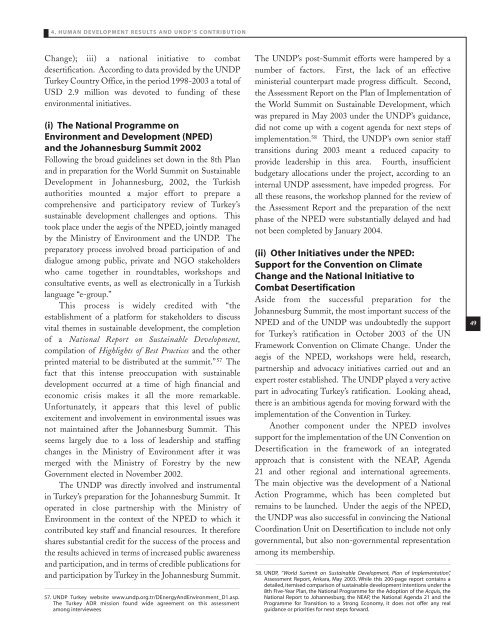Reports - United Nations Development Programme
Reports - United Nations Development Programme
Reports - United Nations Development Programme
Create successful ePaper yourself
Turn your PDF publications into a flip-book with our unique Google optimized e-Paper software.
4. HUMAN DEVELOPMENT RESULTS AND UNDP’S CONTRIBUTION<br />
Change); iii) a national initiative to combat<br />
desertification. According to data provided by the UNDP<br />
Turkey Country Office, in the period 1998-2003 a total of<br />
USD 2.9 million was devoted to funding of these<br />
environmental initiatives.<br />
(i) The National <strong>Programme</strong> on<br />
Environment and <strong>Development</strong> (NPED)<br />
and the Johannesburg Summit 2002<br />
Following the broad guidelines set down in the 8th Plan<br />
and in preparation for the World Summit on Sustainable<br />
<strong>Development</strong> in Johannesburg, 2002, the Turkish<br />
authorities mounted a major effort to prepare a<br />
comprehensive and participatory review of Turkey’s<br />
sustainable development challenges and options. This<br />
took place under the aegis of the NPED, jointly managed<br />
by the Ministry of Environment and the UNDP. The<br />
preparatory process involved broad participation of and<br />
dialogue among public, private and NGO stakeholders<br />
who came together in roundtables, workshops and<br />
consultative events, as well as electronically in a Turkish<br />
language “e-group.”<br />
This process is widely credited with “the<br />
establishment of a platform for stakeholders to discuss<br />
vital themes in sustainable development, the completion<br />
of a National Report on Sustainable <strong>Development</strong>,<br />
compilation of Highlights of Best Practices and the other<br />
printed material to be distributed at the summit.” 57 The<br />
fact that this intense preoccupation with sustainable<br />
development occurred at a time of high financial and<br />
economic crisis makes it all the more remarkable.<br />
Unfortunately, it appears that this level of public<br />
excitement and involvement in environmental issues was<br />
not maintained after the Johannesburg Summit. This<br />
seems largely due to a loss of leadership and staffing<br />
changes in the Ministry of Environment after it was<br />
merged with the Ministry of Forestry by the new<br />
Government elected in November 2002.<br />
The UNDP was directly involved and instrumental<br />
in Turkey’s preparation for the Johannesburg Summit. It<br />
operated in close partnership with the Ministry of<br />
Environment in the context of the NPED to which it<br />
contributed key staff and financial resources. It therefore<br />
shares substantial credit for the success of the process and<br />
the results achieved in terms of increased public awareness<br />
and participation, and in terms of credible publications for<br />
and participation by Turkey in the Johannesburg Summit.<br />
————————————————————————————————————<br />
57. UNDP Turkey website www.undp.org.tr/DEnergyAndEnvironment_D1.asp.<br />
The Turkey ADR mission found wide agreement on this assessment<br />
among interviewees<br />
The UNDP’s post-Summit efforts were hampered by a<br />
number of factors. First, the lack of an effective<br />
ministerial counterpart made progress difficult. Second,<br />
the Assessment Report on the Plan of Implementation of<br />
the World Summit on Sustainable <strong>Development</strong>, which<br />
was prepared in May 2003 under the UNDP’s guidance,<br />
did not come up with a cogent agenda for next steps of<br />
implementation. 58 Third, the UNDP’s own senior staff<br />
transitions during 2003 meant a reduced capacity to<br />
provide leadership in this area. Fourth, insufficient<br />
budgetary allocations under the project, according to an<br />
internal UNDP assessment, have impeded progress. For<br />
all these reasons, the workshop planned for the review of<br />
the Assessment Report and the preparation of the next<br />
phase of the NPED were substantially delayed and had<br />
not been completed by January 2004.<br />
(ii) Other Initiatives under the NPED:<br />
Support for the Convention on Climate<br />
Change and the National Initiative to<br />
Combat Desertification<br />
Aside from the successful preparation for the<br />
Johannesburg Summit, the most important success of the<br />
NPED and of the UNDP was undoubtedly the support<br />
for Turkey’s ratification in October 2003 of the UN<br />
Framework Convention on Climate Change. Under the<br />
aegis of the NPED, workshops were held, research,<br />
partnership and advocacy initiatives carried out and an<br />
expert roster established. The UNDP played a very active<br />
part in advocating Turkey’s ratification. Looking ahead,<br />
there is an ambitious agenda for moving forward with the<br />
implementation of the Convention in Turkey.<br />
Another component under the NPED involves<br />
support for the implementation of the UN Convention on<br />
Desertification in the framework of an integrated<br />
approach that is consistent with the NEAP, Agenda<br />
21 and other regional and international agreements.<br />
The main objective was the development of a National<br />
Action <strong>Programme</strong>, which has been completed but<br />
remains to be launched. Under the aegis of the NPED,<br />
the UNDP was also successful in convincing the National<br />
Coordination Unit on Desertification to include not only<br />
governmental, but also non-governmental representation<br />
among its membership.<br />
————————————————————————————————————<br />
58. UNDP, “World Summit on Sustainable <strong>Development</strong>, Plan of Implementation”,<br />
Assessment Report, Ankara, May 2003. While this 200-page report contains a<br />
detailed, itemised comparison of sustainable development intentions under the<br />
8th Five-Year Plan, the National <strong>Programme</strong> for the Adoption of the Acquis, the<br />
National Report to Johannesburg, the NEAP, the National Agenda 21 and the<br />
<strong>Programme</strong> for Transition to a Strong Economy, it does not offer any real<br />
guidance or priorities for next steps forward.<br />
49

















